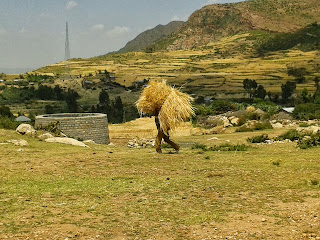In the last four weeks or so I have begun work in the county
of Arbegona. Yaya is the central town in
the area and has a population of 12,000-15,000. Arbegona approximately has
a population of 150,000 and it sits atop a mountain about 2 hours outside of
Hawassa. Due to the high altitude it is much colder than I ever had hoped for in
Ethiopia especially at night and early in the mornings. I feel like I should
not ever see my breath in Africa. The
people in this area speak a tribal language called “Sudaminya.” However if a
person has some basic education they do speak a bit of “Amharic” the national
language however “Sudaminya” is much more common, and you’d be surprised how
many people do not have even a basic education. People make their living under
one of three main categories, farming, government work, or horse breeding and
cattle raising. The area is naturally very rich in resources and the people
almost souly live off of the land and the resources Mother Nature provides them
with. Injera is not a traditional food for these people, unlike other areas of Ethiopia. There is something
called a “false banana” plant that people eat and prepare, below is a picture of the false banana plant. This plant also has many other useful qualities, the leaves are used to wrap and carry other produce, the outside of the trunk can be made into rope or twine, and then the inside of the trunk is made into the local food called "kocha"
 |
| False Banana plant, broken down eaten and used for various other things |
 |
| Arbegona (Southern Ethiopia) |
 |
| More of the Arbegona landscape its beautiful there and very rich in natural resources |
I was told a story by an Ethiopian from Arbegona and thought it was rather interesting. It begins with… a well-educated man from Addis Ababa (the capital city of
Ethiopia) who went to Arbegona for work. He ran into a farmer lying in the
grass and this was the conversation between the 2 men.
Addis man:
Why are you not working?
The farmer:
because I am finished and have no more to do.
Addis man:
If you work hard you can improve your life
Farmer: If I
work hard what am I going to gain?
Addis man:
more possessions (clothes, shoes etc.)
Farmer: I am
wearing clothes and shoes… What else am I going to gain by working harder
Addis man: Well
more food for you and your family
Farmer: I
already have enough food to feed myself and family. What else can I gain by
working hard?
Addis man: a
car and a better house.
Farmer: Why
there are no roads up here. What else can I gain by working harder?
… This goes
on a few more times between the two until this statement.
Addis man:
You will gain happiness
Farmer: I
have already achieved happiness
I’m not sure exactly how telling this story is of the people in Arbegona but thought it was interesting to hear. Below are a few pictures of work and the houses the people live in as they are very different compared to the houses in the Tigray region.
 |
| supportive supervision visit at health center |
 |
| Quick on the job feedback during a supportive supervision visit |
 |
| Me in Arbegona in front of the local houses "Gojo bet" |
 |
| Local house in the southern region of Ethiopia it is called a "Gojo Bet" |
 |
| Contruction of a new "Gojo Bet" |
There has
also been one other aspect of my life that has changed significantly and that
is compound/house life in Hawassa. I have to be aware of the obnoxious monkeys
that frequent my compound they are little thieves. If I were to relate them to
an animal in America it would be a raccoon except monkeys have opposable
thumbs. They get into and destroy everything. Below are some monkey pictures
most of them were taken outside my door but I was also at a hotel one morning
and they were creating havoc among the staff and guests at the hotel.
 |
| Monkey at the hotel/restaurant. You can't really see it in this photo but he had found the kitchen and stolen a garlic clove |
 |
| Naughty monkey at the table next to me |
 |
| Monkey in compound tree... Hes hoping I'll leave my food |
 |
| That is an avocado tree and he snatched a ripe avocado from the top of the tree |
 |
| Monkey in compound looking for food near our table and chairs |
 |
| Snoozing in the tree above my door |



























































